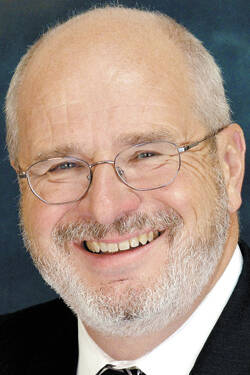STURGEON BAY, Wisconsin—In the end, there was little but sadness to feel.
A court in this lovely little community in northern Wisconsin sentenced former Franklin College President Thomas Minar to six years in prison and six years of extended supervision on sex crimes charges.
Minar was arrested two and a half years ago when he arranged to meet for sex with what he thought was a 15-year-old boy at a local McDonald’s. Instead, it was an undercover officer. The police subsequently found large caches of child pornography on Minar’s cell phone.
The judge who sentenced Minar, David Weber, called Minar’s crimes “serious offenses” that left the court with a duty to protect the public by putting the former academic behind bars.
Minar will be transferred to a Wisconsin state prison from the Door County Jail within days.
Thus ends a strange episode in Franklin College history.
I was in the courtroom while Minar was sentenced. I’ve been to all his court dates, working with a team of Franklin College student journalists who were covering his story.
This time, I was seated maybe 30 feet from him when he entered the courtroom, shackled, in orange jailhouse garb and accompanied by an armed guard.
As Minar sat and waited for his lawyers to arrive, I thought about the odd path he and the college had traveled to get to this point.
Franklin College is like a second birth home for me. In addition to being the school where I teach, it is my alma mater.
It is a place I love.
I remember the excitement when Minar was announced as the school’s president. The first openly gay man to serve as Franklin’s president, he came to the college with a reputation as a wizard fundraiser, a man who could conjure up great possibilities for the old school.
We thought a grand new era was about to commence.
Instead, he proved to be a spectacularly poor fit for a school such as Franklin College.
The fundraising miracles never materialized. The school drifted while Minar focused his time and energy on projects that made little sense.
No rational person can fault those who hired him for not discovering he was a sex offender. The law enforcement officials I’ve talked with tell me that offenders with Minar’s profile are skilled—very skilled—at covering their tracks.
Other traits were clear early on. The man’s self-aggrandizement and self-absorption made him a poor choice for a school that often serves first-generation college students, strivers who want to make their way in the world rather than young people who already have it made.
Minar made clear from the beginning what a mismatch he was for the role he was supposed to perform.
In his inaugural address, he talked about how being a college president always had been one of his life goals and thanked everyone for making it happen.
In other words, he talked with students about how they had helped him achieve his dream rather than about how he was going to help him achieve theirs. They—and the college—existed to serve him, rather than the other way around.
At his sentencing, Minar and his legal team described the ways the pressures of being a college president drove him to break the law. They said being trapped between the college’s board and faculty made his life a pressure cooker.
As they said that, I wondered what he thought the job would be. Leadership is about balancing the needs and concerns of varied constituencies and resolving differences, so people with different interests and from varied backgrounds find ways to work together.
If it were supposed to be easy, more people would be able to do it well.
After he was first arrested, I talked with students who felt confused, hurt and betrayed by Minar’s actions.
I told them that what he had done reflected on him.
Not on the college.
And certainly not on them.
They moved forward from that moment to do splendid work covering a tough story. They demonstrated tremendous discipline, maturity and professionalism.
I am proud of them.
They showed their strength of character, a strength of character their former president often failed to appreciate.
That this is not the saddest piece of this sorry tale is sad indeed.
John Krull is director of Franklin College’s Pulliam School of Journalism and publisher of TheStatehouseFile.com, a news website powered by Franklin College journalism students. Send comment to [email protected].




